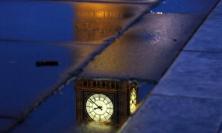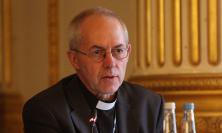In August, Prime Minister David Cameron immediately accepted the vote in the House of Commons against any armed intervention in Syria. The Political and Constitutional Reform Committee is now looking at formalising Parliament’s role in conflict resolution. Joe Egerton urges the Committee to apply the insights of St Thomas Aquinas to this task.
On 28 August 2013, the day before the Members of the House of Commons voted on the principle of British military intervention in Syria, The Times carried an editorial that purported to summarise the thought of St Thomas Aquinas on what constituted a ‘ just war’:
Thomas Aquinas set out three criteria for a just war. It must occur for a good and legitimate purpose; it must be waged by a legitimate authority and peace must be a central motive even in the midst of violence. [1]
Although The Times was not completely accurate in its account of what St Thomas had written, it was right to see St Thomas’s brief response to the question he posed – of ‘whether any war is permissible’ [2] –as the starting point for any discussion of jus ad bellum: justice in starting a conflict. Aquinas made the first really substantial attempt since Thucydides’ Melian dialogue to explore this question in terms of ‘justice’ rather than in terms of divine command [3], and the precision and brevity of his work has secured it a lasting place in our thinking on these matters.
At 10pm on 29 August, the Commons divided and, by a majority of 13, rejected the Government’s motion. The Prime Minister immediately accepted the decision of the Commons and said that the United Kingdom would not use force in Syria. The influential Political and Constitutional Reform Committee (PCRC) has since announced an inquiry into Parliament’s Role in Conflict Decisions [4]. This article argues that the proceedings in the House of Commons at the end of August were conducted – rightly – in the tradition of St Thomas Aquinas (although the conclusion was different to that reached by The Times) and that the forthcoming inquiry will produce good fruit if it is conducted in a similar manner .
A question of reason
Although the opening question St Thomas sets out to answer in the Summa Theologiae is whether war (bellum) is licitum (literally ‘permissible’, but with the strong connotation ‘allowed by God’), when St Thomas sets out his own position, he begins by stating that three things are necessary for any war to be iustum (just) [5].
In contrast to licitum, iustum signals the engagement of the cardinal virtue of justice. For St Thomas, all virtues are directed towards the achievement of our true and final good, which is not to be fully attained in this life but only in the life to come in the presence of God. But while the theological virtues come from God, the cardinal virtues are accessible to every human through reason. Charity, the redeeming love of the Father and the Son flowing through the office of the Holy Spirit, is the form of all the virtues; all true virtues – moral, intellectual, theological – depend upon charity.
So when the Summa applies the adjective iustum to the noun bellum, creating our modern phrase ‘a just war’, we see a development of the utmost importance in political philosophy: the idea that we can answer the question, ‘can we fight?’ by use of our natural reason, and a consequent expansion of the role of secular rulers. The introduction of iustum paves the way for the first condition for a just war – that it be fought by the auctoritas of a princeps. [6] Auctoritas is legitimate (we would say constitutional) authority, not just power; and princeps is to be understood as ‘government’.
St Thomas’s first test for a Just War
The first requirement in the Summa for a just war is not a papal endorsement but: ‘The authority of a princeps, by whose command the war is to be waged’ – i.e. a legitimate authority on whose orders war is to be waged.
St Thomas then asserts that a princeps has the responsibility to guard the state and its people. [7] This is an application of his political philosophy, that the authority of a government is bestowed by the people. [8]
What does this mean to us today? We need to flesh out the notion of princeps. While we have clearly moved on from the decision to go to war belonging to the Prime Minister and Cabinet, the Constitutional Committee of the House of Lords recently reported: ‘At present the role played by Parliament in such decisions varies widely: there is no standard process by which Parliament becomes involved.’ [9]
Political theologians who have seen themselves as working in the tradition of St Thomas have, over seven centuries, developed his concept of government owing its authority to the people in various ways. The 16th century English Jesuit, Robert Parsons, was one such scholar and he gave a prominence to Parliament that is unusual in political theology. Declaring, ‘the English Parliament, by old received custom of the realm, is the fountain ... of all public laws and settled orders within the land’, he went on to advocate an ‘order of proceeding’ in which the reasons ‘on one side and the other’ be ‘opened and layd down’. On 29 August, David Cameron followed exactly that process. The decision to submit the question of using force in Syria to Parliament was in the Thomistic tradition, as was the immediate and complete acceptance of the vote in the Commons.
But what if the vote had gone the other way? Does the Commons have the authority to authorise war, given the provisions of the UN Charter? A natural reading of the Charter is that (unless the United Kingdom or one of its NATO allies is actually attacked) force can only be used after a resolution of the UN Security Council.
Although there were strong questions about the legality of the Iraq War, in fact it offers little precedent because there was an argument with at least some degree of probability that resolutions already passed authorised the use of force. Nobody suggested that any existing resolution allowed use of force against Syria, so the case is different from that of Iraq. Some MPs argued that launching an attack on Syria without a Security Council resolution would fail the first of St Thomas’s tests; others, including the Attorney General in his advice to government, argued that a resolution of the Security Council was not absolutely necessary.[10] The issue was whether humanitarian obligations warranted use of force without a Security Council resolution. This issue was treated with the greatest seriousness. Although nobody did so explicitly, speakers on both sides could plausibly have claimed the support of St Thomas because he linked legitimacy to a powerful passage from Psalm 82: ‘rescue the poor and free the destitute from the hand of the sinner’. [11] Is this intended to explain the duty of those in authority and thus make illegitimate a use of force that does not rescue the poor? Or does it compel a princeps to action? [12] The difference is subtle: the latter might provide the basis of an argument that armed force could be employed even without the sanction of the Security Council; the former would not. It would be helpful if the PCRC examines in depth the interaction between Parliamentary consent and the UN Security Council.
St Thomas’s second test
This test questions whether the target is deserving of the military action proposed against them: force can only be used ‘because they are guilty of some act of culpable aggression’. The level of proof of the Syrian regime’s guilt of the atrocities for which they were being blamed was raised in the House. [13] There are issues over the provision of information for the PCRC to ponder. It is of course necessary that action be proportionate to the offence committed.
This second test also touches on the question of whether war really is the ‘last resort’. St Thomas may not have set this out explicitly, but he implied it when he a quoted passage from St Augustine referring to recovering what has been wrongly taken. Surely if occupied territory can be recovered by negotiation, then a war to regain it is unjust; and this implies the ‘last resort’ test.
St Thomas’s third test
The Times described the third criterion in these words: ‘peace must be a central motive even in the midst of violence.’ St Thomas did indeed write a sentence that is elegantly and accurately rendered by The Times, but it is part of the concluding reply to an argument that war was inherently sinful.
The third criterion is actually that the intention of those waging war must be recta (‘straight’ or ‘right’), either to achieve good or to prevent evil. St Thomas quotes St Augustine to warn against certain specific examples of a bad motive – for example, the desire for gain or to inflict cruelty. MPs did consider intention, but there was in this case little evidence of any impropriety. [14]
But exclusion of an obviously improper motive is not enough. For an intention to be right, more is required. The distinguished Catholic philosopher and disciple of Wittgenstein, Elizabeth Anscombe, gave an account in her 1957 book, Intention, cited as a seminal work in modern Catholic philosophy by Alasdair MacIntyre.[15] To identify an action as just is to identify the intention or intentions embodied in that action. An agent who acts with deliberation does so having in mind the intended consequences of his action; that is, he intends an action that will have all the consequences that he can foresee, even those he may not desire. So if I intentionally and deliberately do something that involves taking the lives of innocent people, albeit with the intention of achieving some good through these means, then what I do is, whatever else it may be, murder. It was as a result of reasoning thus that Anscombe opposed Oxford’s granting of an honorary degree to President Truman – she considered him the mass murderer of the innocent at Hiroshima and Nagasaki.
If intention is understood as embracing all foreseeable consequences, irrespective of whether they are desired, then it picks up many of the problems discussed in the House - including those implied by such difficult questions as: ‘If Assad goes on using nerve gas, what do we do next time?’, for possible failure to deter is a foreseeable consequence. Reading the debates in Hansard one is struck by how comprehensively the question of intention (as understood by Anscombe) was examined byMPs and Peers.
Is an opportunity about to be missed?
The Political and Constitutional Reform Committee has suggested that the Inquiry it is starting should be brief, as ‘the Government has a clear, positive position’ on Parliament’s role in conflict decisions. Even if the principle of a full debate followed by a binding vote – a principle which was employed admirably by David Cameron at the end of August – is enshrined in law, the debate over Syria showed that some major and unresolved issues remain, not least the relative authority of the House of Commons and the UN Security Council. If the Committee seeks answers in principle to this and other difficult questions, the consideration of the arguments on both sides in the tradition of St Thomas will be important, just as it was in the particular debate over Syria; for St Thomas believed passionately that when we weigh the strongest arguments for and against a proposition, we move nearer to that truth which is a gift of the Holy Spirit.
Joe Egerton works in the City as Chief Operating Officer of a stockbroker specialising in shares of medium-sized firms. He has lectured at the Mount Street Jesuit Centre .
[1] The Times, 28 August 2013. Modern theologians argue that there are more than three criteria which must be fulfilled in order for a war to be considered just. See ‘Just War Theory’ by Roger Dawson SJ in Thinking Faith: www.thinkingfaith.org/articles/20131011_2.htm.
[2] ST IIaIIaeQ40 . The original Latin is in the Corpus Thomisticum at http://www.corpusthomisticum.org/sth3034.html
[3] For the Melian dialogue, see Thucydides 5.84-116. The general approach in the ancient world was to regard the regulation of war as a matter for the gods – treaties were usually marked by oaths; a truce was proclaimed for the Olympic Games etc. In the 11th century, Pope St Gregory VII – Hildebrand – had declared that the decision as to whether it was licit to wage a war was part of the plenitude of apostolic power wielded by the successor of St Peter. In this he was codifying widely accepted practice in Christendom – for example, William Duke of Normandy obtained a papal brief declaring his right to the English crown from Hildebrand’s predecessor Alexander II before his invasion of England in 1066.
[4] This follows earlier reports both by the PCRC and the House of Lords Constitution Committee which contain valuable evidence from leading academic authorities. All of this is available on the Parliament website (www.parliament.uk) and the PCRC 6th Sept short report gives the necessary references.
[5] The discussion of conditions for a just war is to be found in the list of the effects of Caritas (Charity) not the discussion of iustitia (justice). However the headings in the Summa should not be regarded as creating impermeable divisions: see, for instance, the discussion of misercordia at IIaIIaeQ30 with its reliance on secular writers as well as the scriptures.
[6] Later writers – for instance Suarez and Vittoria – add the word respublica to princeps in their discussions; respublica is best translated in these texts as ‘government’ (e.g. of Venice) while princeps is a monarch.
[7] The Latin text reads Cum autem cura reipublicae commissa sit principibus, ad eos pertinet rem publicam civitatis vel regni seu provinciae sibi subditae tueri. The translation offered on the CCEL website is hopelessly anachronistic with its rendering of respublica as ‘the common weal’. Respublica is ‘the state’.
[8] This reflects the mediaeval practice of acclamation of a King by the Lords and Commons. When William I was crowned, it was with the approval of those assembled for the coronation – Norman and English alike. It may be that anybody who dissented would have met a nasty end, but that assent was given is beyond doubt.
[9] Second Report of Session 2013-14, HL Paper 46, para 1 .
[10] For the case against acting without a Resolution, see Dame Tessa Jowell Hansard 28 August Col 1454; for the argument for intervening without a Resolution, see Sir Malcolm Rifkind Hansard 29 Aug Col 1449
[11] This eschatological psalm is entitled ‘Against the judges of the nations’ and verse 4 quoted by St Thomas - eripite pauperem, et egenum de manu peccatoris liberate – gives a direct command to government.
[12] See the intervention of Sir Tony Baldry Hansard 28 Aug Col 1430
[13] See, for, instance the intervention of Dr Julian Lewis: Hansard 29 Aug Col 1436
[14] Mr Peter Lilley did discuss intention and made a significant reference to President Holland: see Hansard 29 Aug Col 1845
[15] God, Philosophy, Universities , p. 160 et seq.- from which the remainder of this paragraph is drawn.
![]() ?Just War Theory? by Roger Dawson SJ in Thinking Faith
?Just War Theory? by Roger Dawson SJ in Thinking Faith![]() ?Ad mentem Divi Thomae: Thomas Aquinas, the philosopher-saint? by Joe Egerton in Thinking Faith
?Ad mentem Divi Thomae: Thomas Aquinas, the philosopher-saint? by Joe Egerton in Thinking Faith






